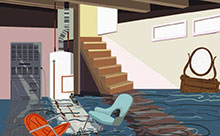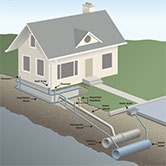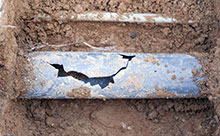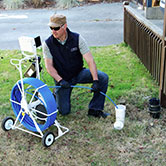The Issue
 Underground sewer and stormwater pipes deteriorate over time. They require periodic inspection and maintenance to maximize their service life. Failing pipes can result in:
Underground sewer and stormwater pipes deteriorate over time. They require periodic inspection and maintenance to maximize their service life. Failing pipes can result in:
- Basement flooding which is expensive, disruptive and damaging to personal belongings.
- Sewage leaking to the environment.
- Rainwater and groundwater mistakenly draining to the sanitary sewer system (referred to as inflow and infiltration), which can result in sewer overflows and beach closures.
The CRD and member municipalities proactively inspect and maintain their pipes. It’s recommended that home owners also take action by periodically having their pipes camera inspected and maintained as required.
Your Underground Pipes
 Your home has the following underground pipes that convey wastewater, rainwater and groundwater away from your home.
Your home has the following underground pipes that convey wastewater, rainwater and groundwater away from your home.
Foundation drain: Installed around a home near the base of the foundation to drain water away from the house and prevent wet basements and flooding.
Sewer lateral: Conveys wastewater from sinks, showers, toilets and laundry to the municipal sewer system or a septic system.
Stormwater lateral(s): Conveys rainwater and groundwater from your perimeter drains and roof (through gutters and downspouts) to the municipal stormwater system or onsite drainage.
In general, homeowners are responsible for maintaining the pipes between the house and the property line. In Oak Bay, however, this responsibility extends all the way to the municipal sewer main and stormwater drainage system.
Pipes Need Maintenance
 Risk Factors
Risk Factors
Underground pipes deteriorate over time and eventually need to be replaced. Generally, pipes are the same age as the house, unless they have been replaced. Most pipes installed before the 1980s have already exceeded their "design life" (their expected lifespan). Additional risk factors include slow draining pipes, standing water in pipes, or a damp basement.
Be Pro-Active
- Locate your underground pipes and cleanouts. This will help plumbers in the event of a pipe failure and can identify potential problems (i.e. roots in pipes from nearby trees, cracked pipes, misaligned pipe joints, or grease buildup).
 Have your pipes camera inspected by a plumber or drainage specialist; ideally someone who can also auger or flush your pipes if the camera is impeded by a blockage.
Have your pipes camera inspected by a plumber or drainage specialist; ideally someone who can also auger or flush your pipes if the camera is impeded by a blockage.- Fix identified problems before they result in basement flooding!
- Consider installing backwater valves if your basement is below street level.
- Confirm your insurance coverage. Many basic insurance policies provide little or no coverage for basement flooding. Confirm:
- Does my coverage include damage from sewer and/or stormwater backups or overland flooding?
- What is the deductible for this coverage?
- What is the maximum dollar value of the coverage?
- Can I claim costs for accessing and repairing the pipe (digging up the yard, landscaping, etc)?
- If you experience a backup, only call the municipality if your plumber has confirmed that the source of an issue (blockage, etc.) comes from municipally owned pipes.